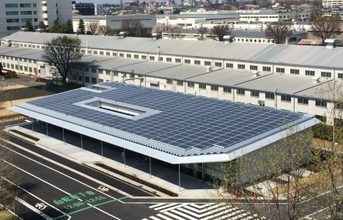
Toshiba Corporation is all set to initiate the opening of the Toshiba Group Hydrogen Energy Research and Development Center (HRDC) at its Fuchu Complex in western Tokyo. The new center will concentrate Group-wide initiatives to realise a hydrogen economy, and will drive forward the development and demonstration of solutions integrating hydrogen-related energy technologies. It aims to increase the sales of hydrogen-related business to 100 billion yen by 2020.
Looking to the future, Toshiba aims to establish a hydrogen supply chain by 2025. The aim is to generate electricity in hydrogen-fired gas turbine power plants in Japan using the hydrogen produced overseas at low cost, using large-scale windmills. This will allow large amounts of hydrogen, a source of carbon-free clean electricity, to be stored and supplied without any need for a transmission line to connect the overseas power generation source, and Japan, the power consumption point.
The combined annual market scale for fuel cells and other hydrogen-related equipment and infrastructure is projected to reach 40 trillion yen by 2030.
Toshiba has essential technologies, including photovoltaic, wind, hydro and other renewable generation systems, water electrolysis systems and fuel cells, for achieving a hydrogen economy, a future where hydrogen is utilised as a low carbon clean fuel source. It looks to integrate these technologies in end-to-end solutions, extending from production to utilisation of hydrogen.
Working towards the realisation of local energy production for local consumption, Toshiba targets developing a practical energy supply system that uses renewable energy to power hydrogen-generating water electrolysis systems, and then uses fuel cells to convert that hydrogen to electricity as and when needed. The system will be deployed in locations where electricity generation and transmission costs are high, such as isolated islands and remote places, so as to help cut costs and achieve a stable electricity supply.
Output from solar and wind power sources is unreliable, but it can be used to power water electrolysis systems that produce hydrogen, and that hydrogen can be transported and stored for use when needed. In addition to other applications, hydrogen is expected to be used as the fuel to for fuel cells, which can produce power and water in the event of a disaster.
End



























